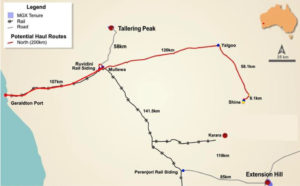Iron ore miners make hay while the sun shines
Mining
Mining
Mount Gibson Iron (ASX:MGX) is well positioned to capitalise on buoyant demand for Australian iron ore as it targets first sales from its Shine direct shipping iron ore project in WA for mid-2021.
The price for 62 per cent iron ore content is currently sitting at $US123.50 ($172.25) per tonne — its highest level since February 2014, according to reports.
“We are pleased to be able to capitalise on the positive iron ore market conditions by progressing the Shine iron ore project in order to extend our significant presence in the Mid-West, where we have been an established iron ore exporter since 2004,” chief executive Peter Kerr said.
The mine is a near-term, low-capital production opportunity that further extends the company’s presence in the Mid-West region and uses existing port and logistics capacity.
The Shine project is 85km north of Mount Gibson’s Extension Hill mine, and 230km east of Geraldton port in WA, from where the company has been exporting since 2004.
The company is targeting production of 1.5 million wet metric tonnes (wmt) per year from Shine, indicating an initial mine life of two years starting in the first half of 2021.
There is the potential to extend for an extra two depending on prevailing market conditions.

Average cash operating costs for Shine before government royalties are $65-70/wmt and the project has a development cost of $17m to $20m.
Ore from Shine can be trucked a distance of 300km to Geraldton port.
“Our detailed review of the project has confirmed Shine as an attractive production opportunity that can be quickly brought on-line and appropriately staged to suit market conditions,” Kerr said.
Mount Gibson acquired the Shine project from iron ore junior Gindalbie Metals, now a subsidiary of Chinese steel company Ansteel, in 2014 for $12m.
An additional $3m is payable to Ansteel when Mount Gibson starts selling ore from the project in mid-2021.
A royalty of 20c per tonne is due to Ansteel on every dollar above $115 per dry metric tonne if premium-grade iron ore prices average more than this in a monthly period.
Mount Gibson operates the iron ore mine on Koolan Island off WA’s Kimberley coast which produces higher grade direct shipping ore, and the Extension Hill mine in Geraldton’s hinterland.
At its Koolan Island mine, the company plans to start an elevated stripping phase lasting 12 to 18 months that is expected to boost cashflow and sales from 2022.
The company’s iron ore sales for the 2020 financial year were close to 5 million wmt, and its net profit after tax was $84m for the period.
Another iron ore company making progress is GWR Group (ASX:GWR), which expects to become a producer when its Wiluna West direct shipping ore project in WA starts up.
DSO is high grade material that requires only minimal processing such as crushing before it is exported, thereby keeping costs low.
GWR has started pre-production infill and grade control drilling at the project, it said this week.
“GWR is well positioned to exploit the commodity cycle and has engaged a consultant to assist with the establishment of offtake agreements for sale of product,” GWR chairman Gary Lyons said.
China has been steadily buying up commodities including iron ore since its economy rebounded from the COVID-19 pandemic.
Two factors have propelled iron ore market prices to elevated levels this year, according to analysts.
Firstly, China’s strong spending on iron ore-intensive infrastructure such as rail lines, electricity transmission pylons, and bridges and buildings.
Secondly, supply issues in rival iron ore exporter Brazil including as a result of the COVID pandemic.
“We broadly expect iron ore prices to decline as Vale brings back curtailed production gradually and China’s steel demand eases (as stimulus fades in 2021),” Commonwealth Bank of Australia commodities markets analyst Vivek Dhar said in a report this week.